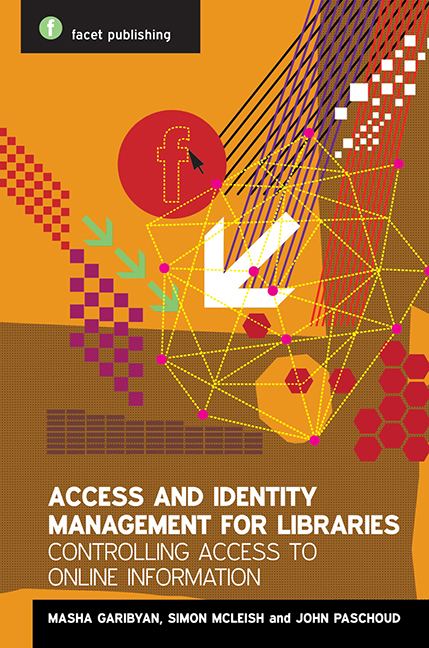Book contents
- Frontmatter
- Contents
- Foreword
- Acknowledgements
- Note to readers
- Glossary
- 1 What is access management, and why do libraries do it?
- 2 Electronic resources: public and not so public
- 3 Principles and definitions of identity and access management
- 4 Current access management technologies
- 5 Authentication technologies
- 6 Authorization based on physical location: how does the internet know where I am?
- 7 Authorization based on user identity or affiliation with a library: who you are? Or what you do?
- 8 Federated access: history, current position and future developments
- 9 How to choose access management and identity management products and services
- 10 Internet access provided by (or in) libraries
- 11 Library statistics
- 12 The business case for libraries
- Afterword
- Appendix 1 Case studies
- Appendix 2 A White Paper on Authentication and Access Management Issues in Cross-organizational Use of Networked Information Resources
- Index
Foreword
Published online by Cambridge University Press: 10 September 2022
- Frontmatter
- Contents
- Foreword
- Acknowledgements
- Note to readers
- Glossary
- 1 What is access management, and why do libraries do it?
- 2 Electronic resources: public and not so public
- 3 Principles and definitions of identity and access management
- 4 Current access management technologies
- 5 Authentication technologies
- 6 Authorization based on physical location: how does the internet know where I am?
- 7 Authorization based on user identity or affiliation with a library: who you are? Or what you do?
- 8 Federated access: history, current position and future developments
- 9 How to choose access management and identity management products and services
- 10 Internet access provided by (or in) libraries
- 11 Library statistics
- 12 The business case for libraries
- Afterword
- Appendix 1 Case studies
- Appendix 2 A White Paper on Authentication and Access Management Issues in Cross-organizational Use of Networked Information Resources
- Index
Summary
It's a pleasure to be able to write a short foreword to this book, which I think will be very useful to librarians, publishers and information technologists trying to gain insight into the complexities surrounding access to licensed networked information resources in settings such as universities or public libraries. This book documents a bit of history that's not well known, a little folklore that I don't think has been written down before, and some tacit knowledge that hasn't been well codified; both are needed to understand where we are today, how we got here, and why.
I’m honoured to have some of the work hosted and co-ordinated by the Coalition for Networked Information (CNI) recognized as a pivotal stage in the development of authentication and access management strategies; I do agree with the authors that the period from around 1997 to 2000 was key in establishing the central ideas and the roadmap, although implementing this roadmap took a long time – surely longer than many of us would have believed in, say, 1999. As you can see, the CNI white paper of which I served as editor (and which is reproduced as Appendix 2 to this book) never made it past a draft stage; things were happening too fast, and there seemed to be little value in perfecting the document. Instead, it paved the way ahead along two distinct roads.
One was technical, and involved the development and deployment of Shibboleth and the organizational frameworks such as InCommon that make the technical mechanisms work. Here I want to recognize the contributions of a number of leaders in the formulation of the white paper, and in the subsequent protocol and software design and implementation work, which quickly moved to other venues, such as Internet2 and later InCommon. They include (but are certainly not limited to) Scott Cantor, Steve Carmody, Michael Gettes, Ken Klingenstein, the late R. L. ‘Bob’ Morgan, and Oren Sreebny. And I’ll apologize now for the many other names that I’ve omitted here.
The second road was a policy-based one, adding new depth to the very complex issues of individual user privacy in the context of licence negotiations and subsequent operational relationships.
- Type
- Chapter
- Information
- Access and Identity Management for LibrariesControlling Access to Online Information, pp. ix - xiiPublisher: FacetPrint publication year: 2014

